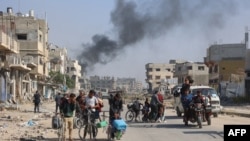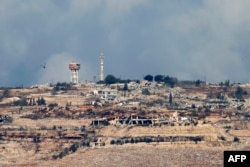President Joe Biden reiterated his “ironclad” defense of Israel during a Tuesday Oval Office meeting with Israel’s president – and he echoed the wish to see the return of the remaining hostages still held by militant group Hamas after more than a year of brutal conflict in Gaza.
“My commitment to Israel is ironclad,” Biden told President Isaac Herzog during their morning meeting in the White House. “And we share a deep friendship.”
Herzog underscored his government’s main objective: “First and foremost, we have to get the hostages back.”
“It all starts in Tehran,” he said. “It all starts in the empire of evil, where, in Tehran, with its proxies, they are doing whatever they can to derail stability and security and peace, calling for the annihilation of the State of Israel and seeking nuclear weapons, Mr. President, this has to be a major objective all throughout your term and the next term of the next president, because we have to make sure that they cannot fulfill their evil intentions.”
A day earlier in Washington, Herzog told a gathering of North American Jewish community groups that the Israeli administration considers incoming President Donald Trump “a champion of peace and cooperation and a great friend of Israel.”
Washington is Israel’s top military and diplomatic supporter, and these mannered talks are happening against a backdrop of violence.
Israeli strikes killed at least 14 people in Gaza, Palestinian authorities said Tuesday, and plumes of smoke were rising above the southern Beirut’s suburbs less than an hour after Israeli forces told residents to evacuate.
While fighting continues, international aid groups issued a report saying Israel has not met a Tuesday deadline set by the U.S. to allow more aid into the Gaza Strip.
But the Israeli military said hundreds of packages of food and water have been brought to an area in northern Gaza where it has been focusing operations.
Last month, the Biden administration told Israel to “surge” more food and supplies into Gaza or risk a cut in military aid.
The State Department said Secretary of State Antony Blinken and Israeli Minister of Strategic Affairs Ron Dermer met in Washington on Monday and “reviewed steps that Israel has taken to improve the dire humanitarian situation inside Gaza in a response to the letter sent by the secretary and Secretary of Defense [Lloyd] Austin on October 13.”
“The secretary emphasized the importance of ensuring those changes lead to an actual improvement in the dire humanitarian situation in Gaza, including through the delivery of additional assistance to civilians throughout Gaza. The secretary further reiterated the importance that Israel take every possible step to minimize civilian harm,” said State Department spokesperson Matthew Miller in a statement on Tuesday.
On Tuesday, a group of eight international aid organizations said that of 19 measures of compliance with the U.S. demands, Israel failed to comply with 15 and only partially complied with four.
“Israel not only failed to meet the U.S. criteria that would indicate support to the humanitarian response, but concurrently took actions that dramatically worsened the situation on the ground, particularly in Northern Gaza,” the report said. “That situation is in an even more dire state today than a month ago.”
The U.N. Office for the Coordination of Humanitarian Affairs said 85% of its attempts to coordinate aid convoys and humanitarian visits to northern Gaza were denied or impeded last month.
The office made 98 requests to Israeli authorities for authorization to go through the checkpoint along Wadi Gaza but only 15 made it, U.N. spokesman Stephane Dujarric said Monday.
On Monday night, the Israeli security Cabinet approved more aid for Gaza, which will increase the number of trucks that enter each day, an official familiar with the matter told The Associated Press.
Airstrikes in Gaza, Beirut
A late Monday strike killed at least 11 people in a cafeteria west of Khan Younis, according to officials at Nasser Hospital. A strike early Tuesday hit a house at a refugee camp in central Gaza, killing three people, according to al-Awda Hospital, which received the casualties.
Early Tuesday, the Israeli army told residents in Beirut’s southern suburbs to leave immediately, warning that it would strike Hezbollah targets there.
“You are located near facilities and interests affiliated with Hezbollah, against which the Israel Defense Forces will act in the near future,” military spokesman Avichay Adraee said in a post on X that included a map showing the buildings it would target in the Lebanese capital.
Less than an hour later, according to Agence France-Presse, two strikes hit the area and plumes of gray smoke were rising.
Witnesses told AFP gunfire could be heard in the area ahead of the strikes warning shots by residents for people to leave following the evacuation call.
Israel’s defense minister, Israel Katz, said on X Tuesday that during a meeting with military officials, he reiterated that Israel will continue hitting Hezbollah with full force and that there will be no cease-fire.
The war in Gaza was triggered when Hamas-led militants stormed into southern Israel on Oct. 7, 2023, killing about 1,200 people, mostly civilians, and abducting about 250. Some 100 hostages are still inside Gaza, although about one-third of them are believed to be dead.
Israel’s counteroffensive has killed more than 43,000 Palestinians, more than half of them women and children, according to local health authorities. The Israeli military says the death toll includes thousands of Hamas militants.
Both Hamas and Hezbollah have been designated as terrorist organizations by the United States.
Some information in this report came from The Associated Press, Reuters and Agence France-Presse.
This post was originally published on here









